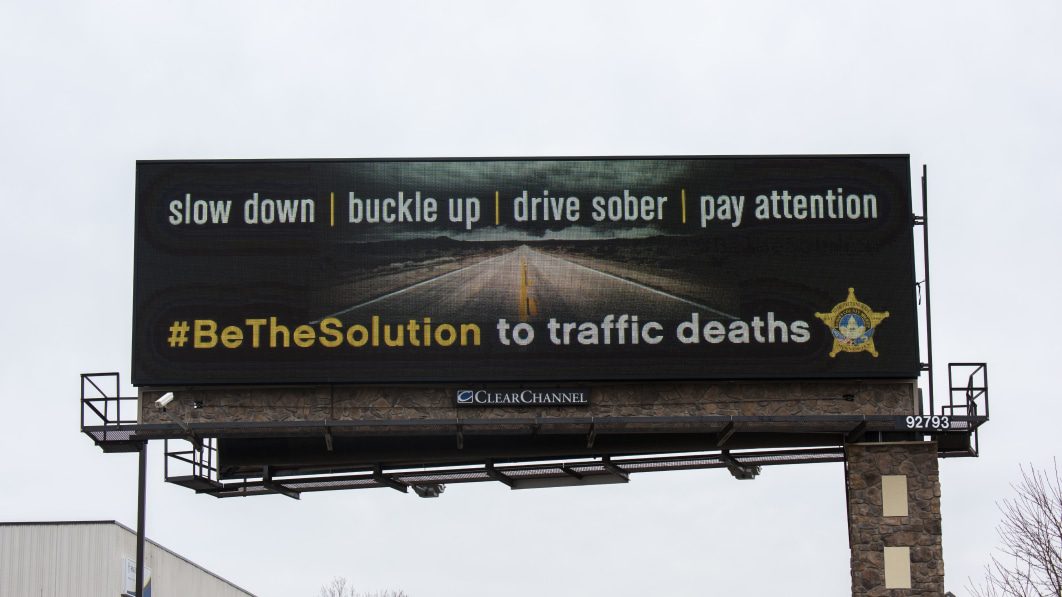NTSB: All vehicles should include a blood alcohol monitoring system

As part of an official report released by the National Transportation Safety Board in the aftermath of a 2021 crash, the NTSB is recommending that the National Highway Traffic Safety Administration mandate blood alcohol monitoring systems. Such systems can stop intoxicated drivers from operating a vehicle, and could drastically reduce the number of alcohol-related crashes in the United States, says the NTSB.
In the crash highlighted by the report, a drunk driver in a Dodge Journey SUV crossed the center line on the way home from a New Year’s Day party and collided head-on with a Ford F-150 pickup truck, killing both drivers and seven occupants between the ages of 6 and 15. The SUV driver’s blood alcohol level was 0.21%, nearly three times California’s legal limit. He also had marijuana in his system (toxicology reports suggest both drivers may have used marijuana during the day), but the agency said the alcohol was more than enough to severely impair his driving. The SUV was traveling 88 to 98 miles per hour, the report said.
According to NHTSA’s Fatality Analysis Reporting System (FARS), nearly 43,000 people were killed last year, the greatest number in 16 years, as Americans returned to roads after pandemic stay-at-home orders. In 2020, the most recent figures available, 11,654 people died in alcohol-related crashes, according to NHTSA data. That’s about 30% of all U.S. traffic deaths, and a 14% increase over 2019 figures when approximately 28% of overall traffic fatalities that year involved alcohol impairment.
The NTSB has no regulatory authority and can only ask other agencies to act, but said the recommendation is designed to put pressure on NHTSA to move. It could be effective as early as three years from now.
Under last year’s bipartisan infrastructure law, Congress required NHTSA to make automakers install alcohol monitoring systems within three years. The agency can seek an extension. In the past it has been slow to enact such requirements. The legislation doesn’t specify the technology, only that it must “passively monitor” a driver to determine if they are impaired.
“We need NHTSA to act. We see the numbers,” NTSB Chairman Jennifer Homendy said. “We need to make sure that we’re doing all we can to save lives.”
The NTSB, she said, has been pushing NHTSA to explore alcohol monitoring technology since 2012. “The faster the technology is implemented the more lives that will be saved,” she said.
The recommendation also calls for systems to monitor a driver’s behavior, making sure they’re alert. She said many cars now have cameras pointed at the driver, which have the potential to limit impaired driving.
But Homendy says she also understands that perfecting the alcohol tests will take time. “We also know that it’s going to take time for NHTSA to evaluate what technologies are available and how to develop a standard.”
The agency and a group of 16 automakers have been jointly funding research on alcohol monitoring since 2008, forming a group called Driver Alcohol Detection System for Safety.
The group has hired a Swedish company to research technology that would automatically test a driver’s breath for alcohol and stop a vehicle from moving if the driver is impaired, said Jake McCook, spokesman for the group. The driver wouldn’t have to blow into a tube, and a sensor would check the driver’s breath, McCook said.
Another company is working on light technology that could test for blood alcohol in a person’s finger, he said. Breath technology could be ready by the end of 2024, while the touch technology would come about a year later.
It could take one or two more model years after automakers get the technology for it to be in new vehicles, McCook said.
Once the technology is ready, it will take years for it to be in most of the roughly 280 million vehicles on U.S. roads.
Juan Pulido, 37, whose wife and four children were killed in the crash, said he’s happy the NTSB is pushing for alcohol monitoring because it could stop another person from losing loved ones. “It’s something that their families have to live with,” he said. “It doesn’t go away tomorrow.”
Pulido’s lawyer, Paul Kiesel, says driver monitoring systems also could stop crashes caused by medical problems or drowsiness, saving anguish and billions in hospital treatment costs.
Material from the Associated Press was used in this report.
Related video:







